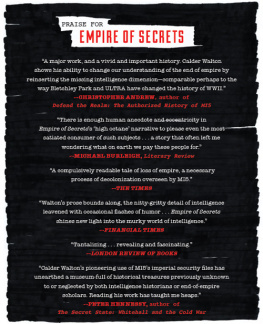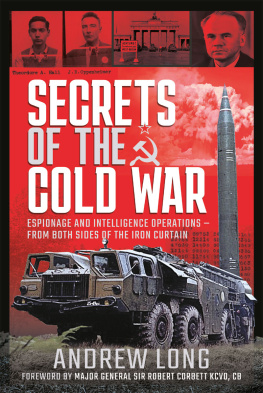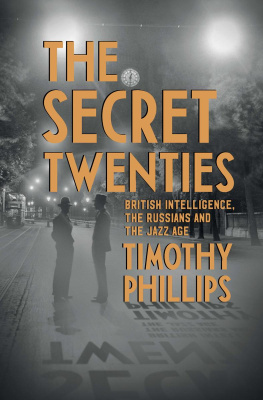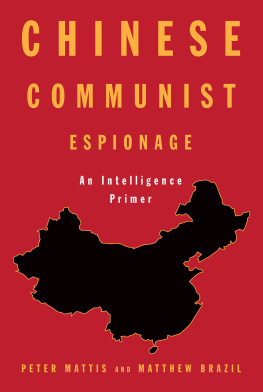This edition first published in hardcover in the United States in 2013 by
The Overlook Press, Peter Mayer Publishers Inc.
www.overlookpress.com
For bulk and special sales, please contact ,
or write us at the address above.
Copyright Calder Walton 2013
All rights reserved. No part of this publication may be reproduced or transmitted in any form or by any means, electronic or mechanical, including photocopy, recording, or any information storage and retrieval system now known or to be invented, without permission in writing from the publisher, except by a reviewer who wishes to quote brief passages in connection with a review written for inclusion in a magazine, newspaper, or broadcast.
ISBN: 978-1-4683-1043-6
TO JENNIFER
Abwehr German espionage service
ASIO Australian Security Intelligence Organisation Australian domestic intelligence service
ASIS Australian Secret Intelligence Service Australian foreign intelligence service
CIA Central Intelligence Agency American foreign-intelligence-gathering agency
CID Criminal Investigation Department Department of regular police force
CPGB Communist Party of Great Britain
DIB Delhi Intelligence Bureau Pre-independence Indian intelligence agency
DSO Defence Security Officer MI5 liaison officer in a colonial or Commonwealth country
FBI Federal Bureau of Investigation US law-enforcement agency
GC&CS Government Code & Cypher School Pre-war and wartime British SIGINT service
GCHQ Government Communications Headquarters Renamed post-war British SIGINT service
HOW Home Office Warrant MI5s mechanism for mail and telephone interception
HUMINT Human intelligence
IB Intelligence Bureau Indian intelligence service, another name for DIB
IPI Indian Political Intelligence Pre-independence agency in London responsible for intelligence on Indian affairs
JIC Joint Intelligence Committee High table of British intelligence community
KGB Committee for State Security Soviet foreign intelligence-gathering agency
LIC Local Intelligence Committee Regional colonial intelligence set up in colonies on MI5s advice in early Cold War
MI5 British intelligence service responsible for counter-espionage, counter-subversion and counter-sabotage in British territory
MI6 Secret intelligence service responsible for gathering HUMINT from non-British territories
NSA National Security Agency US SIGINT agency
RCMP Royal Canadian Mounted Police Canadian law-enforcement agency
SAS Special Air Service British special forces
Security Service MI5
SIFE Security Intelligence Far East MI5 inter-service intelligence outfit in the Far East
SIGINT Signals intelligence
SIME Security Intelligence Middle East MI5 inter-service intelligence outfit in the Middle East
SIS Secret Intelligence Service British foreign-intelligence-gathering service
SLO Security Liaison Officer MI5 liaison officer in a colonial or Commonwealth country
We are quite impartial; we keep an eye on all people.
HERBERT MORRISON , Home Secretary (February 1941)
In times of travail, Britains tendency was to rely more, not less, on spies. Her entire empire history urged her to do so. The thinner her trade routes, the more elaborate her clandestine efforts to protect them. The more feeble her colonial grip, the more desperate her subversion of those who sought to loosen it.
JOHN LE CARR , The Honourable Schoolboy
On a cold morning in April 1947, a female terrorist slipped into the main headquarters of the Colonial Office in London. After politely asking a security guard if she could shelter from the chill indoors, she placed an enormous bomb, consisting of twenty-four sticks of dynamite, wrapped in newspaper, in the downstairs toilet, then calmly walked back out into the busy street and disappeared into the crowd. Her identity was not known at the time to either the police or MI5, but she worked for a terrorist cell in Britain belonging to the Stern Gang, one of the two main paramilitary organisations fighting the British in Palestine. The explosives used for the bomb had been given to her by another Stern Gang agent, a wounded Franco-Jewish war veteran, known as the dynamite man, who had avoided detection by smuggling the dynamite into Britain in his artificial leg. The aim of these agents, and of other Stern Gang cells operating in Britain, was to use violence to force the British government into establishing an independent Jewish state in Palestine.
Even before this incident, MI5 had already been placed on high alert for possible terrorist outrages to be conducted in Britain. In the light of increasingly alarming reports from its sources in the Middle East, warning that Jewish paramilitaries planned to extend their war against the British from Palestine to Britain itself, MI5 mounted intensive surveillance operations on known radical Jewish and Zionist groups in Britain. MI5s investigations revealed a number of terrorist cells operating in London, whose members were planning bombing campaigns and assassinations of leading British politicians. In 1946 the head of MI5 briefed the Prime Minister that he and cabinet ministers were targets. That same year, another terrorist cell launched a letter-bomb campaign directed at every member of the British cabinet. All of the bombs, found to be potentially lethal, were successfully intercepted.
The bomb left in the Colonial Office was only detected after, by sheer luck, it had failed to go off because its timer broke. If it had successfully detonated, it would have caused carnage and chaos at the centre of Whitehall, probably on a similar scale to an attack that the other main militant group fighting the British in Palestine, the Irgun, had carried out in Jerusalem in July 1946, blowing up the King David Hotel and killing ninety-one people.
When the bomb at the Colonial Office was discovered, it led to an immediate Europe-wide search for the female Stern Gang agent, headed by MI5, SIS (MI6) and the London Special Branch. She was eventually apprehended in Belgium. MI5 also identified Irgun members operating in Britain, who were kept under surveillance or arrested. The head of the Irgun, however, remained at large, and continued to plan attacks against the British, in both Palestine and Europe. His name was Menachem Begin. He went on to become the sixth Prime Minister of the state of Israel, and the joint winner of the Nobel Peace Prize.
This episode is just one among a vast number of remarkable, and mostly undisclosed, security operations that Britains intelligence services were involved in during the period immediately after the Second World War, when Britain began to lose its empire. It has only recently been revealed through declassified intelligence records, and it not only adds a new chapter to the history of the early Cold War, but also has a chilling contemporary resonance. In a striking parallel with the world today, it reveals that the infiltration and radicalisation of a terrorist minority from the Middle East was experienced in Britain more than half a century ago. In fact, as this book reveals, in the aftermath of the Second World War the main threat to British national security did not come from the Soviet Union, as we might expect, but from Middle Eastern terrorism. However, the terrorists then did not come from Palestinian and Islamist groups, as they would do in the late twentieth century, and do today, but from Jewish (or Zionist) extremists. As Niall Ferguson has argued, terrorism is the original sin of the Middle East.












